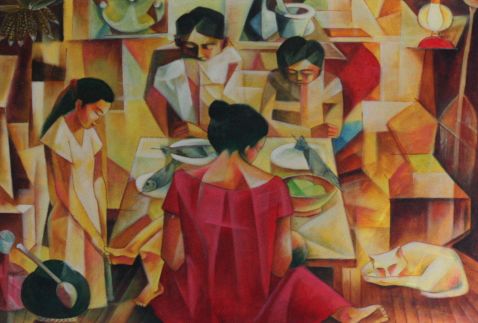A World Without EnglishBy Jose A. CarilloIn the farming village where I grew up there was a man—a maker of homemade coconut oil—who did not believe in anything his mind could not grasp or which lay outside the life he knew. Let us call him Pedro de la Cruz. He was born at about the same time as my father in the early decades of the last century, but for some reason his schooling was cut short in the second grade, while my father went on to normal school in Manila to become a schoolteacher. Pedro thus could not understand, write, or speak English beyond the usual peremptory greetings like “Good morning!” or “Good afternoon!” Even these he affected to be beneath his dignity saying. In fact, he viewed with contempt people who spoke English in his presence; once they had left, he would spit on the ground and call them social climbers who surely would not make it to wherever it was they were going. “Mark my words,” he would say in the dialect, “they who think they are so good in a foreign tongue will soon come crashing to the ground!”

Pedro, along with his whole family, was intensely religious. Prayer colored his day as it did his wife Pilar, who was also hardly literate; his eldest son Gregorio, who was my classmate in grade school; Jacinto, the next born; and Teresita, their only daughter. Every morning when the parish church bell rang some two kilometers away, and again at Angelus, they would stop their hand-driven coconut press and pray all the Mysteries of the Holy Rosary. Sundays they would don their Sunday’s best for Holy Mass without fail, all five going to church on foot. Their religiosity, together with the almost unceasing oil-making in their small, hand-driven mill, was the central unifying force of their lives.
Pedro was fiercely obstinate about the worldview that sustained this way of life. One time, back from Manila during a summer college break, I made the mistake of discussing Darwin’s Theory of Evolution with him. I explained that Darwin had determined that man might have sprung from the same prehistoric ancestral stock as that of the apes. This launched Pedro into a strangely eloquent diatribe against the false beliefs fostered by science and the infidels they produced. He gave me the disconcerting feeling that I was the biology teacher being prosecuted by William Jennings Bryan during the Scopes Monkey Trial, the only difference being that Clarence Darrow was nowhere around to defend me. And on matters like this, Pedro simply had to have the last word. You had to give up the argument because if you didn’t, it would go on past midnight in his hut, which in those days without electricity would be lit only by a flickering coconut-oil lamp.

Pedro’s deep religiosity resulted in a frightening determinism. “Not a leaf will fall from the tree if God will not will it,” he would intone with fire in his eyes, “and that leaf will surely rise back to the twig if he wished it.” He also believed that God would surely provide for his family no matter what happened. For this reason, he did not think it necessary for any of his children to be educated beyond the level he had attained. In fact, he thought that every learning beyond this was simply a form of needless expense, a totally irrelevant enterprise that would only corrupt the way one ought to earn a living, grow into adulthood, raise a family, and end up in the grave like everybody else.
The impact of this worldview was most profound in the case of Gregorio, who was in the same class with me from the second to the sixth grade. Gregorio’s talent in arithmetic was astonishing. He could add an eight-level array of ten-digit numbers in less than a minute, and could multiply a ten-digit number by another ten-digit number almost as fast. His grasp of English, unfortunately, was just above rudimentary. There had been no English-language reading materials in the de la Cruz household to stoke the fires of his otherwise brilliant mind, and the siblings could not or did not dare speak English with him. There was also no radio to stimulate his English comprehension; his father thought it a nuisance and a vexation to the spirit (TV was still a good 25 years away into the future). Had his English been at least as good as mine, which was by no means that good, I have no doubt that he would have been our class valedictorian. He could have gone on to high school and college and surely could have made something of himself, perhaps a mathematics or physics professor in a major university. But this was not be.
Because Pedro did not send anyone of the siblings to high school and kept a life of penury, no money went out of the family bourse except those that went to food and the upkeep of their manual oil-making equipment. He kept his hut the thatched roof affair that it had always been, dismissing galvanized iron sheets as no good because they got so hot in summers; bought no motor vehicle, preferring to move on foot as always and to continue using a carabao-drawn cart to haul coconut and other cargo to his oil mill; and forced his family to live totally without entertainment and vice. This made the de la Cruz family outwardly prosperous and even enabled them to extend loans to the neighborhood in the form of coconut oil or petty cash. An emboldened Pedro could thus boast to the villagers that without even learning a word of English and without making his children take nonsense subjects in high school and college, his family was better off than most except the
jueteng operator and the U.S. Navy
pensionados in town.
The neighborhood grew and flowed out; villagers moved to town, to the cities, to countries unknown and unheard off; houses big and small, built by money from overseas, sprouted all over. But Pedro’s hut stood unruffled and unchanged. After he and his wife passed away, the de la Cruz siblings continued to live in the same small, unfenced plot of land. They built satellite huts around their father’s, raised families, and set up their own hand-driven oil mills. But each had no dream or ambition beyond what their father had decreed. From each of the four hand-driven mills there would issue, day in and day out, the same peculiar sweetish odor of burnt coconut. Pedro’s legacy of a world without English would keep it that way until it had totally spent itself.
This essay, which first appeared in my English-usage column in The Manila Times
and subsequently formed part of my book English Plain and Simple
, is part of a collection of my personal essays from mid-2002 to date. I’ll be posting one of them in the Forum every Wednesday from October 26, 2016 onwards.